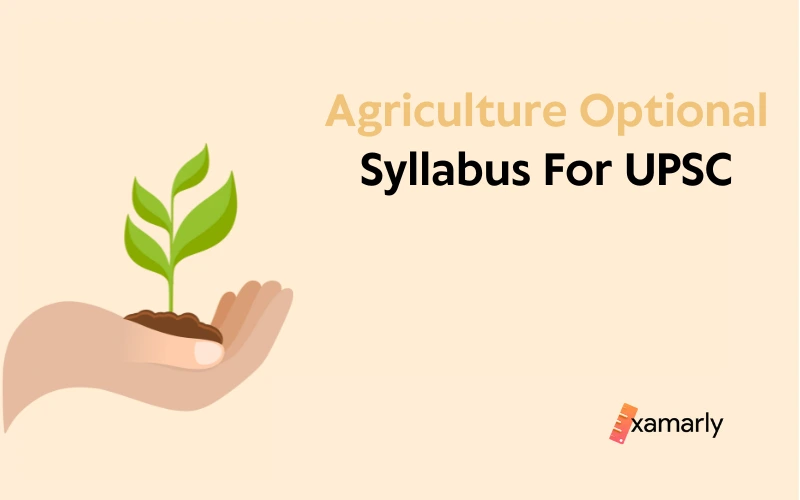If you have an agricultural background, the agriculture optional syllabus for UPSC is a great choice because it is not very difficult to learn. The field of agricultural science includes everything from soil cultivation to the breeding of animals for food, fiber, and other items. Your performance on the main exam can also be enhanced by agricultural science. It offers a thorough understanding of agriculture as a science that can be efficiently applied to real-world problems. Agriculture. The UPSC optional Agriculture syllabus places a strong emphasis on students’ capacity to approach the topic as science and apply what they learn to real-world issues.
- Agriculture Optional Syllabus For UPSC
- Significant Topics To Prepare For Agriculture
- UPSC Agriculture Optional Exam Pattern for IAS Mains 2022
- How to Prepare for the UPSC Agriculture Optional Syllabus
- Best Books for UPSC Agriculture Optional Subject
- Conclusion
- FAQs On UPSC Syllabus For Agriculture Optional
Agriculture Optional Syllabus For UPSC
Agriculture Optional UPSC Syllabus Of Paper I
| Ecology | Ecology and its relevance to man Natural resources, their sustainable management and conservation Physical and social environment as factors of crop distribution and production Agro ecology; cropping pattern as indicators of environments Environmental pollution and associated hazards to crops, animals and humans Climate change – International conventions and global initiatives Green house effect and global warming Advance tools for ecosystem analysis – Remote sensing (RS) and Geographic Information Systems (GIS). |
| Agronomy | Cropping patterns in different agro-climatic zones of the country Impact of high yielding and short-duration varieties on shifts in cropping patterns Concepts of various cropping and farming systems. Organic and Precision farming Package of practices for production of important cereals, pulses, oil seeds, fibres, sugar, commercial and fodder crops |
| Weed science | Weeds – characteristics Dissemination and association with various crops; their multiplications Cultural, biological, and chemical control of weeds |
| Forestry | Important features and scope Various types of forestry plantations such as social forestry, agro-forestry, and natural forests Propagation of forest plants. Forest products. Agro forestry and value addition Conservation of forest flora and fauna |
| Soil science and nutrient management | Soil- physical, chemical and biological properties Processes and factors of soil formation. Soils of India Mineral and organic constituents of soils and their role in maintaining soil productivity. Essential plant nutrients and other beneficial elements in soils and plants. Principles of soil fertility, soil testing and fertilizer recommendations. Integrated nutrient management Biofertilizers Losses of nitrogen in soil, nitrogen-use efficiency in submerged rice soils, nitrogen fixation in soils Efficient phosphorus and potassium use Problem soils and their reclamation. Soil factors affecting greenhouse gas emission |
| Soil and water conservation | Soil conservation Integrated watershed management. Soil erosion and its management. Dry land agriculture and its problems. Technology for stabilizing agriculture production in rain fed areas. Water-use efficiency in relation to crop production Criteria for scheduling irrigations Ways and means of reducing runoff losses of irrigation water. Rainwater harvesting. Drip and sprinkler irrigation. Drainage of waterlogged soils Quality of irrigation water Effect of industrial effluents on soil and water pollution. Irrigation projects in India |
| Agricultural economics | Farm management, scope, importance and characteristics, farm planning. Optimum resource use and budgeting. Economics of different types of farming systems. Marketing management – strategies for development, market intelligence. Price fluctuations and their cost; role of co-operatives in agricultural economy Types and systems of farming and factors affecting them. Agricultural price policy. Crop Insurance |
| Agricultural extension | Agricultural extension, its importance and role Methods of evaluation of extension programmes Socio-economic survey and status of big, small and marginal farmers and landless agricultural labourers. Training programmes for extension workers Role of Krishi Vigyan Kendra’s (KVK) in dissemination of Agricultural technologies. Non-Government Organization (NGO) and self-help group approach for rural development. |
Agriculture Optional UPSC Syllabus Of Paper II
| Cell biology | Cell structure, function and cell cycle. Synthesis, structure and function of genetic material. Laws of heredity. Chromosome structure, chromosomal aberrations Linkage and cross-over, and their significance in recombination breeding. Polyploidy, euploids and aneuploids. Mutations – and their role in crop improvement. Heritability, sterility and incompatibility, classification and their application in crop improvement. Cytoplasmic inheritance, sex-linked, sex-influenced and sex-limited characters |
| Plant breeding | History of plant breeding. Modes of reproduction, selfing and crossing techniques. Origin, evolution, and domestication of crop plants, center of origin, the law of homologous series, crop genetic resources conservation and utilization. Application of principles of plant breeding, improvement of crop plants. Molecular markers and their application in plant improvement. Pure-line selection, pedigree, mass and recurrent selections, combining ability, its significance in plant breeding. Heterosis and its exploitation. Somatic hybridization. Breeding for disease and pest resistance. Role of interspecific and intergeneric hybridization. Role of genetic engineering and biotechnology in crop improvement. Genetically modified crop plants |
| Seed production and technology | Seed production and processing technologies Seed certification, seed testing, and storage. DNA fingerprinting and seed registration. Role of public and private sectors in seed production and marketing. Intellectual Property Rights (IPR) issues, WTO issues, and its impact on Agriculture. |
| Plant physiology | Principles of Plant Physiology with reference to plant nutrition, absorption, translocation and metabolism of nutrients. Soil – water- plant relationship. Enzymes and plant pigments; Photosynthesis- modern concepts and factors affecting. C3, C4 and CAM mechanisms. Factors affecting aerobic and anaerobic respiration Carbohydrate, Protein and fat metabolism. Growth and development; photoperiodism and vernalilzation. Plant growth substances and their role in crop production. Physiology of seed development and germination; dormancy. Stress physiology – drought, salt and water stress. |
| Horticulture and landscape gardening | Major fruits, plantation crops, vegetables, spices and flower crops Package practices of major horticultural crops. Protected cultivation and high tech horticulture. Post harvest technology and value addition of fruits and vegetables Landscaping and commercial floriculture. Medicinal and aromatic plants. Role of fruits and vegetables in human nutrition. |
| Plant protection techniques | Diagnosis of pests and diseases of field crops, vegetables, orchard and plantation crops and their economic importance. Classification of pests and diseases and their management. Integrated pest and disease management. Storage pests and their management. Biological control of pests and diseases. Epidemiology and forecasting of major crop pests and diseases. Plant quarantine measures. Pesticides, their formulation and modes of action |
| Food production and nutrition management | Food production and consumption trends in India Food security and growing population – vision 2020. Reasons for grain surplus. National and international food policies. Production, procurement, distribution constraints. Availability of food grains, per capita expenditure on food. Trends in poverty, Public Distribution System and Below Poverty Line population, Targeted Public Distribution System (PDS), policy implementation in context to globalization. Processing constraints. Relation of food production to National Dietary Guidelines and food consumption pattern. Food based dietary approaches to eliminate hunger. Nutrient deficiency – Micro nutrient deficiency , Protein Energy Malnutrition or Protein Calorie Malnutrition (PEM or PCM), Micro nutrient deficiency and HRD in context of work capacity of women and children. Food grain productivity and food security. |
Significant Topics To Prepare For Agriculture
Along with having a solid understanding of every subject included in the syllabus, it’s necessary to pay attention to a few key subjects that come up repeatedly in the UPSC exam. Let’s look at a few of these subjects and some tips to keep in mind for a well-rounded preparation.
- Ecology: Exams frequently assess knowledge of certain topics like environmental contamination, agroecosystems, and their impact on agricultural productivity. The easiest way to be ready is to memorize the common responses and then support them with information and visuals to make them more insightful and complete.
- Agronomy: Questions in this subject frequently concern crop patterns, and the effects of high-yielding cultivars, organic farming, and precision farming. Depending on the temperature zone, cropping patterns can change dramatically, and the introduction of high-yielding and short-duration varieties can cause these patterns to change. Both organic and precision farming are essential techniques for growing food, and each has benefits and drawbacks.
- Soil science and nutrient management: When it comes to questions about topics like nitrogen-use efficiency in submerged rice soils, organic constituents of soil, and saline and alkaline soils (problematic soil), it’s essential to prepare well and consult multiple resources to form a resourceful answer.
- Soil and water conservation: Because a large portion of the syllabus is similar to GS-II and GS-III, you can utilize the same resources to help answer questions in this section. Generally, questions about soil erosion are asked, so prepare and practice relevant drawings to get extra marks.
- Agriculture economics: This section is important for paper 1 and is mainly based on current affairs, so it’s important to keep up with the news and current events. Notes from relevant editorials and magazine articles will help answer questions in this section.
- Cell biology: Regardless of your background in agriculture, this will be the most straightforward section to cover in Agriculture optional syllabus. Use your graduation notes or self-made pointers to cover this section, as clear and static questions are asked about this topic. Provide ample examples with the answers in this section.
- Plant breeding and Plant physiology: If you’re looking for some good books on plant physiology, we recommend checking out VK Jain’s “Fundamentals of Plant Physiology”, Sinha and Pandey’s “Plant Physiology”, or BD Singh’s “Plant Breeding Principles and Methods”. If you want a more concise overview, Phundan Singh’s “Essentials of Plant Breeding” is a great option. Your answers need to be backed up with technical keywords and terminology in this section. You should also include diagrams and visual aids to score more marks.
- Seed production and technology: This section is relatively easy to understand, and questions are often asked about current events. Therefore, noting pointers from newspapers and magazine articles is crucial to preparing for this section.
- Food production and nutrition management: This section of the syllabus overlaps with what will be covered in GS-III, so similar study techniques can be used to excel in this section. Questions on nutrition deficiencies and protein malnutrition are often asked, so it is essential to include relevant examples and supplement your answer with data.
UPSC Agriculture Optional Exam Pattern for IAS Mains 2022
The UPSC Agriculture optional exam is made up of paper 1 and paper 2. Each paper is for 250 marks which makes the overall score of 500 marks for the Agriculture paper.
To know more about the UPSC Exam Pattern, click the linked article.
How to Prepare for the UPSC Agriculture Optional Syllabus
The agriculture optional syllabus for UPSC Mains covers a wide range of subjects. It is important to know the pattern and syllabus of the exam before beginning preparation.
- Knowing the entire syllabus of the UPSC optional agriculture paper is essential.
- Dedicate time to preparing current affairs with specific resources for Agriculture.
- Books are an excellent resource to learn about your chosen optional subject for the civil service exam. Many books are available on the subject of agriculture, so candidates should take some time to choose the ones that will be most useful for their preparation.
- For UPSC aspirants, there is more than one subject, due to which study plan has a significant role in exam preparation. For Agriculture optional, Make monthly, weekly, and daily plans to keep track of current affairs and revise them periodically.
- Practice Answer writing, drawing diagrams, using technical terms to embellish answers, and giving ample examples is a must.
- Analyzing previous year’s questions can give you some insight into what topics are more likely to be tested and the format that the questions take. Try to see what topics come up most often and in what format the questions are asked. It would be best to practice answer writing every day after you finish a topic. This way, you can understand the types of questions that are asked and be better prepared for the exam.
Best Books for UPSC Agriculture Optional Subject
There are different books on agriculture that best suit a particular topic. Here is a list of books considered best for these specific topics by aspirants through the years.
Best Books And Resources To Cover Paper I
- Fundamentals Of Agricultural Extension Education – U Barman
- Agricultural Extension Education in India
- Agronomy – Yellamanda Reddy
- Introductory Soil Science – Dilip Kumar Das
- The Nature And Properties Of Soil – Brady
- Current affairs from The Hindu: Survey of Indian Agriculture and Special Issues of Agriculture.
Best Books And Resources To Cover Paper II
- Introduction To Horticulture – N. Kumar
- Genetics – B.D.Singh
- Plant Breeding: Principles And Methods -B.D. Singh
- Plant Physiology – S N Pandey and B K Sinha
- The Hindu- Survey Of Indian Agriculture
- Elements Of Economic Entomology – B. Vasanthraj David
- Special Issue of Agriculture by The Hindu
Link Of Relatable Articles
Conclusion
Papers 1 and 2 of the UPSC Agriculture Optional Paper each carry 250 marks, for a total of 500 points. The UPSC agriculture optional syllabus is regarded as a high-scoring topic and is comparatively simple to master. If you come from an agricultural background, it’s a great choice. It is a technical subject that calls for a thorough understanding of current affairs. With the correct textbooks and resources, it is rather simple to complete the syllabus.
Time and efficiency will increase with practice drafting answers and working through past exams. Since the syllabus of the UPSC optional agriculture Paper also overlaps with the GS syllabus, careful preparation will also benefit other disciplines. Therefore, it is a worthwhile subject for any UPSC candidate.
FAQs On UPSC Syllabus For Agriculture Optional
What Are The Common Topics In UPSC Optional Agriculture Syllabus And Prelims Syllabus?
In the UPSC prelims syllabus, under the environment and geography section, questions on the basics of topics like agriculture patterns, ecology, soil, and practices are similar.
Is There An Overlap Between Agriculture Optional Syllabus For UPSC And The GS Mains Syllabus?
Yes, the syllabus of UPSC optional agriculture overlaps with the syllabus from General Studies paper II and General Studies paper III, so thorough preparation will help other subjects too.
I Have A Degree In Botany, Is The UPSC Agriculture Syllabus Easier To Cover?
If you have a background in botany, the UPSC agriculture test syllabus is shorter and simpler to complete. The topics touch on general studies and are intimately tied to nature. The content of Botany Papers I and II is similar.






